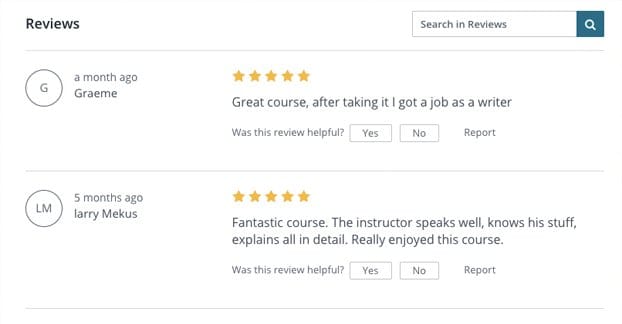Guest blogging certifications are, well, not really a thing. That is, they exist, they’re sometimes actual courses you can take, but they aren’t on the same level as college courses. You won’t go to your local state university and enroll in Guest Blogging 401. There’s no accreditation system for guest blogging courses, or in fact any other courses in IT.
Of course, the courses exist. They’re often real courses you can take, designed by someone who presumably knows what they’re talking about. The thing is, they run the gamut in terms of quality and value. Some “courses” are little more than any of the blog posts we’ve written, broken into a slide deck and made private. Others might be YouTube video courses, and some might even be one on one or one on group consultation courses with an actual instructor.
This lack of regulation means it can vary a lot in terms of what you actually get out of the course. The most basic courses might be nothing more than just a short ebook about why you should be guest posting. The most advanced courses are step by step guides on what exactly you need to do to get a guest post published on your site of choice, regardless of what that site may be.
Does a Guest Post Certification Matter?
I’ll be up-front about this one and say, as far as actual certifications go, not really. Very few people will care if you have a certificate that says you passed some random person’s guest blogging course. You can put it on your resume under accolades and awards, but anyone in a position to care is going to be looking at your portfolio, not your resume. You can mention it when you pitch a guest post, but honestly, tell me if you would care if the positions were reversed.
I, personally, wouldn’t pay heed to someone mentioning a guest blogging course. Either they’re going to use it as an icebreaker to try to sell me the course, or they’re going to talk about how getting me to accept their post is part of the course, or they’re just unduly proud of something that doesn’t deserve pride.
I don’t see a reason why you would want to publicly display a badge or certificate, or put “I passed X certificate course” in your profile, or anything of the sort. It’s just not meaningful to enough people. Maybe, maybe, if the course was widespread, the creator was well known, and it was exclusive enough that passing it is an honor, it might be worthwhile.
The thing is, bragging about a course you passed is nine time out of ten just bragging about how much money you gave to some guy in order to get him to tell you all the stuff you can find for free online.
It’s not like you’re taking the GRE in order to get into a graduate school. It’s not like you’re taking the A+ certification test, the MCSA from Microsoft, or the CCNA from Cisco, or any of the other tech certifications. Those at least require specific knowledge to pass the test and are industry-wide standardized tests. They’re recognized, they’re given by industry leading figures like Microsoft directly, and they prove that you passed a test, and thus have the knowledge to do so.
Do Guest Blogging Courses Have Value?
All of this is not to say that guest blogging courses are useless. After all, typically the people who create courses and charge money for them are the people who have expertise they want to leverage. It’s like hiring a pro-tier influencer to give you a little one on one consultation, except the price won’t be reflective of that level of customization.
Irrespective of the end results of the course, a course in and of itself can have plenty of value. For example, it can teach you techniques and strategies that bloggers won’t just up and share. I give a lot of information and a lot of assistance on this site, but I’m not about to hand out my private contacts list for pitches to just anyone. However, someone running a course might have exclusive information they can provide.
A course also tends to have step by step instructions rather than broad platitudes. I might tell you that the first thing you need to do is pick a site to target, and give you a few instructions like “think of high profile sites in your industry.” A course might, instead, take an example of an industry and provide step by step instructions through Google on how to find potential targets and vet them for quality.
Many of the best courses also offer some form of guarantee. Jon Morrow’s course on guest blogging from Boost Blog Traffic is expensive, nearly $600 once all the payments are complete. The course also has a full month for a no questions asked refund guarantee, and an additional guarantee that if you have not succeeded in getting your guest post published by the end of the 90-day course, you get your money back.
That is all predicated on following the instructions of the course appropriately. I would guess that one of the first instructions is to pick a reasonable target. If you set up a new WordPress.com blog last week, and you enroll in the course today with Forbes as your target, you’re pretty unlikely to actually make it in. Sure, I guess you get the course for free, and you can save the information to use later, but it’s a lot of hoops to jump through just to rent a course you can probably put together with free resources if you’re clever enough.
And, of course, every guest blogging course has an end result where you, ideally, get a link from a guest post. Getting a guest post published with a link, even if the link is nofollowed, is still value on its own. Even just the brand mention can be value enough, and the positioning as an industry influencer plus the traffic and the potential subsequent leads are all good.
Fringe Benefits of Guest Blogging Courses
Some guest blogging course also have fringe benefits that you can’t just pick up from free resources. Reading this blog isn’t likely to leave you with contacts to get your guest posts published, right? Like, I don’t know who you are. Maybe if you chat in the comments a bunch, I’ll eventually recognize you, and then if you want to write for us, you might be able to. That’s it’s own long process, though, and it’s not something you need to take a course to get.
A course can, however, introduce you to people. If the course is held in a small group, you get to know the others in your group and might be able to guest post with each other. If the course is held in a private community – think the Power Hitters Club – you get to meet and network with the other people in the group, even if they took the course long before you. Private communities can be excellent for building up relationships that might not naturally ever happen.
Plus, of course, there’s always the chance to get your foot in the door with the creator of the course. Courses like the above mentioned one from Jon Morrow are unlikely to have you ever corresponding with the creator, of course. They probably just recorded videos and wrote tutorials, they don’t actually call you on Skype or anything. It would be more time than they want to spend. They make courses to make money, not to make more work for themselves.
Some courses, though, might open doors you wouldn’t normally find open. It’s never a reliable thing, and it’s not necessarily going to be a good fit for you, but you never know unless you try.
How to Vet a Guest Blogging Certification Course
If you’re interested in taking a course – that is, if you’re interested in a paid tutorial rather than a bunch of information and finding your own way – you need to know what sort of courses are out there and how to vet them. You don’t want to pay hundreds of bucks for a scraped SlideShare deck or a PDF of an eBook you can get for $5 on Amazon. Here are elements you should look for or avoid when looking at guest blogging courses.
The creator. Who actually makes the course you’re taking? Something like Jon Morrow’s course, the course that comes from GuestBlogging.com, has some pedigree behind them. You know they’re at least going to have solid, up to date information in them, since the people who created them are big enough to have a reputation they care about.
On the other hand, if the course is coming from BestGuestBloggingTips.info, you can bet that it’s probably not very good. Additionally, if the course doesn’t have any author or creator attribution, it’s likely that whoever created it doesn’t have a reputation or name recognition and would rather not volunteer that information. Those are the courses to avoid.
The price. In general, the cheaper the course, the less you’re getting. More expensive courses have higher production values and have more components. I know I keep going back to the Morrow course, but it’s a very public course that has a lot of information available. The course costs nearly $600, as mentioned, but it comes with a lot.
A course that only runs you $100 might be fine, or it might just be a very expensive PDF. A course that’s under $30 is probably not even worth looking at. Sure, it might have some valuable information, but so do the many blogs writing about guest posting as well. On the opposite end of the spectrum, if the course costs thousands of dollars, it better have hands-on instruction from a high-end influencer with a guaranteed relationship if it’s going to be worth the cash.
What’s included. Some courses aren’t going to tell you everything that’s included, but others will. Try to judge based on what’s included, and what you would pay for that in other circumstances. For example, that Morrow course is pricey, but it comes with an ebook, a 17-part video series with homework, various podcasts, videos, and PDFs of supplemental material, a private web forum community, personal assistance from an editor, and the ability to watch weekly Q&A video conferences with Jon. That’s a lot of value, particularly the hands-on editing.
Reviews. You always should check out the reviews of your target course before you enroll. Sometimes they might not be great. Sometimes you get one miffed user who doesn’t like how the course performed. Sometimes you have glowing reviews. It can be all over the map. Just be sure to check reviews before any big purchase, this should be common sense.
So, are there any recommended courses? That depends. I would personally say that if you want some hand-holding, some tutorials, and maybe some connections, the courses at GuestBlogging.com and the more general ContentMarketingUniversity are both serviceable. You can also look into courses on Udemy, but more often than not those will fall on the side of the lower quality PDF tutorial style courses.
Do you have any courses you would recommend?
 ContentPowered.com
ContentPowered.com








